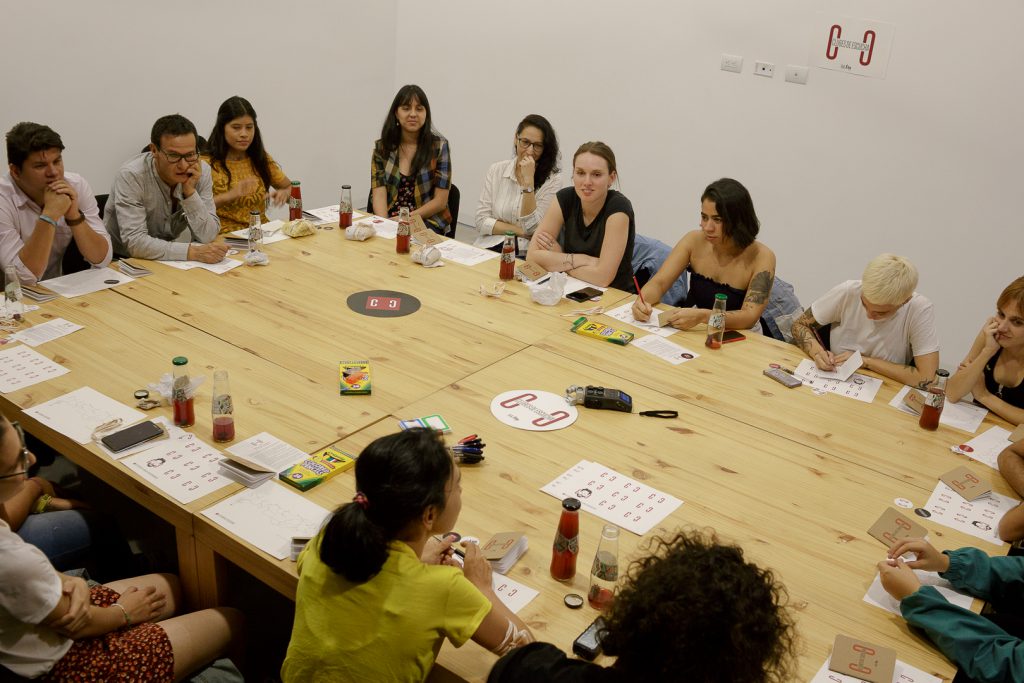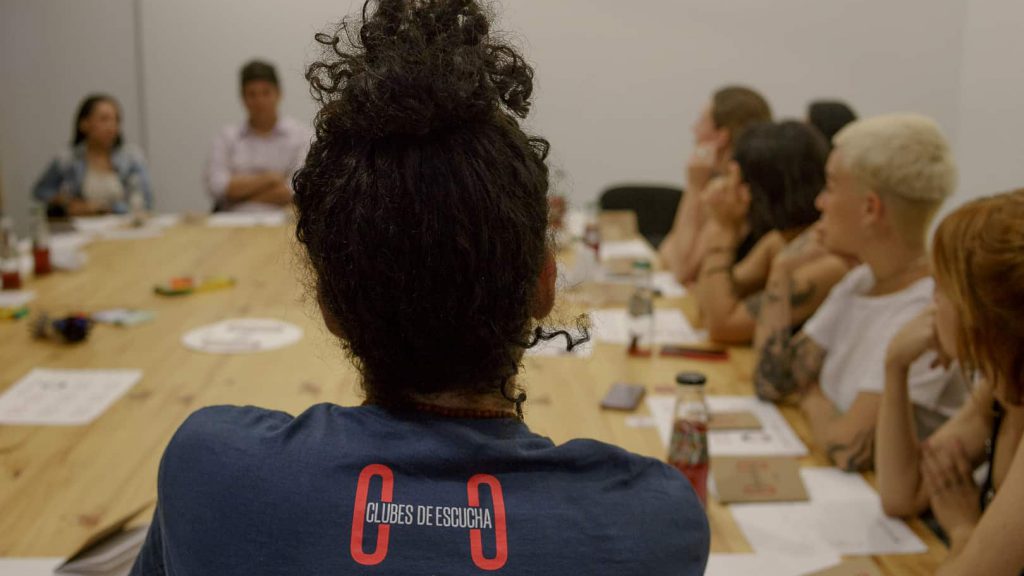“These listening groups were created for the Latino community to know each other better, destroy stereotypes and have a stronger network … and we need that.” – Jorge Caraballo, Radio Ambulante’s Growth Editor
In Latin America, radio has long played a central and essential role in the community. It was not uncommon for groups of people to gather around the radio, listen together, and discuss what they heard. Radio Ambulante, an NPR podcast that tells “uniquely Latin American stories”, has embraced and evolved this tradition. Using the new podcast platform, they have created Listening Clubs (Clubes de Escucha), in which podcast listeners get together in their respective cities, listen to an episode and engage in conversation about the story. And there are dedicated Radio Ambulante listeners here in Connecticut who are on the leading edge.
Ivonne Ramirez Ramirez, a cultural activist, is no stranger to forging her own path in this world. She left her hometown in Mexico for Italy in order to pursue higher education, and once graduated she set her sights on Connecticut. She arrived in Hartford in January 2019. As a crafty, ambitious Latina, Ramirez has learned to utilize the tools within her environment to make connections and Radio Ambulante has given her a great tool with their Listening Clubs. “I always plan, organize and get involved in community projects in the places I live,” she says. “I have also listened to Radio Ambulante for almost two years, so I think that listening to podcasts in groups is a good excuse to get to know each other and share experiences, and also to create a space to empathize and recognize each other in other experiences.”
Jorge Caraballo, Radio Ambulante’s Growth Editor who is also in charge of the Listening Clubs, says the idea blossomed from one of Ambulante’s online Facebook groups, where listeners from all over the world were talking and discussing the stories from the podcast every week. “We were like, this is amazing,” recalls Caraballo. “It is beautiful to see how people are interacting and having meaningful conversations with strangers around the things that interest them, in this case, Radio Ambulante and our Latin American podcast. So why not take this offline and just have the opportunity, or excuse, to get together with new people, meet new people, and we just try it. We were like OK, let’s do a pilot … and this is how it came to be.”
Ramirez says meeting new people was a huge reason she started a Listening Club in Hartford. “It has been difficult for me to adapt to the life here,” admits Ramirez, “and I know that always doing what I am passionate about is what, fortunately, also brings me out of my comfort zone. That is why I had the idea of organizing these sessions. I love the Listening Club because it has allowed me to get to know, more closely, the people who come. There I confirmed that our differences can also be our strengths … as people, as a circle, as a Latino community. I’m not going to lie to you, this Listening Club space also works for me as therapy in some way. It helps me with the transition and adaptation. I hope it is equally enriching for all people who attend it.”

The Listening Club project is still very much in its infancy. To kick things off, a pilot project was launched in February where Radio Ambulante hosted 20 Listening Clubs in eight cities all over Latin America and the U.S. They were assisted with a grant from the News Integrity Initiative at the Craig Newmark Graduate School of Journalism at the City of New York. After the success of the pilot, in June, Radio Amulante opened up the model for these Listening Clubs so that anyone could replicate them. Caraballo says it has been a wonderful success.
The format for the Ambulante Listening Club goes, loosely, like this: Participants arrange a time and location to gather, play the podcast, are encouraged to draw and sketch while listening to the podcast, and afterward engage in a conversation about what they felt, thought about, enjoyed, etc., about the story that they heard. It’s as simple as that. And everyone is encouraged to attend … even if the participant just wants to come work on their Spanish (all podcasts are in Spanish).
“It is not only Latinos that participate here,” confirms Caraballo. “While Ambulante’s listeners, most of them may identify themselves as Latinos, there are also Spanish-learners, people from other cultures, other demographics who also seem to like Ambulante and have been participating in the Listening Clubs. And that’s one of the rules. We welcome anyone. It doesn’t matter if they are not native in Spanish, they are here and they are making an effort to understand the episodes, to understand other listeners when they talk in the club, and so just reward that and treat them with respect.”
This all-inclusive model has given everyone the green light to participate … and they have.
“There have been listeners in Canada, there have been listeners in Guatemala, there have been listeners in many places … in Connecticut they are organizing their own listening clubs,” Caraballo says. “The whole process has been very exciting for Radio Ambulante. If you get online to one of the Facebook groups, you can see how people are organizing themselves to host their own clubs, and that’s been amazing because there are people in more than 60 cities around the world connecting with others and their communities to have face-to-face conversations after listening to our stories. It’s beautiful.”

Radio Ambulante has many reasons to be excited. They have grown steadily since their inception in 2012. Currently, the show produces 30 weekly episodes a year (summers off), each running 30 to 60 minutes in length (in Spanish) and as of 2019, Radio Ambulante estimates they will have 6 million listeners. This success should continue as well, as the market that they have tapped into is only growing: the number of Latinos is growing, the popularity of podcasts keeps rising and Radio Ambulante’s active engagement strategy is working. They have really found the key to using long-form Spanish language journalism to bridge a huge gap in the media.
Radio Ambulante also has other statistics on their side. According to the Reuters Institute Digital News Report, podcasts are wildly popular among younger generations and U.S. Latinos are the youngest ethnic group in the U.S. (the median age is 28). According to the U.S. Census Bureau, almost half the Latinos living in Connecticut are under 25 years old. Also, out of 59 million Latinos in the U.S. (18 percent of the total population) 37 million speak Spanish.
But Radio Ambulante isn’t riding wholly on statistics, their stories are thought-provoking and dig deep into Latin culture. Their journalism team is led by Daniel Alarcón and Carolina Guerrero who help steer the podcast into covering a wonderfully wide-range of stories that mainstream media glosses over or completely excludes. A sampling of stories would include: the genesis of the Puerto Rican debt crisis, or the role of firefighters in Peru, or the journey of a Central American coyote bringing migrants to the U.S. border, or the 2017 Mexican earthquake, or a volcano eruption that erased a Colombian town, or the dangers of pursuing female beauty through surgeries in Colombia. The variety is astounding and the stories are on the forefront of the Latin world albeit on the fringe of mainstream media in the U.S.
Ramirez says these are the kind of stories that remind her of growing up back home in Mexico. “Many of our grandparents in Latin America and the Caribbean, indigenous or not, usually gather to tell stories like this. Fortunately, I also lived that experience with my grandparents. The same goes for Latina women who meet in groups in the kitchen or those who gather to knit. We have not only met for centuries to cook but also to gossip, talk, and listen. Sometimes we think that those are things that do not have much depth but in those meetings, many things happen. That is why getting together to listen has been very important in Latin American and Caribbean tradition and history.”
Radio Ambulante’s Listening Clubs maybe aren’t something entirely new to the Latino community, but they do represent deep traditional values. The Latino community has always valued coming together and listening and observing the world in a way that involves union and dialogue. “Listening exercise, in a deep sense, is very interesting and complicated,” says Ramirez. “Listening to the other person somehow confronts us with ourselves in a very intimate way. In indigenous communities, for example, older people (sometimes called grandparents without having blood ties with them) used to (and still do) tell the youngest people the history of their community or stories that explain natural and social events. Culture and family history were and are also transmitted through oral tradition. The radio for me is closely linked to that oral tradition. And, obviously, it has always been a form of entertainment, of bonding. But these are things that are becoming less and less frequent for many reasons. And it is a shame because these are the things that reinforce the community fabric.”




